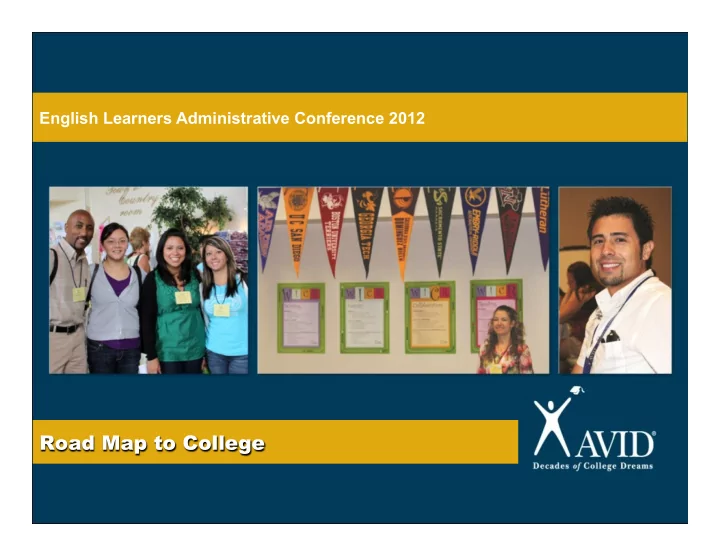

English Learners Administrative Conference 2012 Road Map to College
Outcomes Participants will learn some of the essential components necessary for EL students to move along the path to College and Career Readiness. AVID Summer Institute 2011—Today’s Learners, Tomorrow’s Leaders
AVID’s Mission AVID’s mission is to close the achievement gap by preparing all students for college readiness and success in a global society. AVID Summer Institute 2011—Today’s Learners, Tomorrow’s Leaders
Discussion Question When developing a vision for all students to be college and career ready, what schoolwide elements should be in place? AVID Summer Institute 2011—Today’s Learners, Tomorrow’s Leaders
Myths and Facts MYTH: • There are plenty of upcoming job openings that won’t need a college education; therefore, the “college-for- all” movement is misguided and is setting our students up for failure. - “Myths and Facts from College and Career Ready for All,” Education Trust AVID Summer Institute 2011—Today’s Learners, Tomorrow’s Leaders
Myths and Facts FACTS: • By 2025, 41% of all jobs will require at least a Bachelor’s degree. • 50% of the fastest-growing occupations in the next 10 years will require a Bachelor’s degree or higher. AVID Summer Institute 2011—Today’s Learners, Tomorrow’s Leaders
Myths and Facts MYTH: • Young people can become employed and earn a decent living without going to college. AVID Summer Institute 2011—Today’s Learners, Tomorrow’s Leaders
Myths and Facts FACTS: • Adults with a high school diploma or less will outnumber the jobs available to people with that level of education. • 28 of the 30 occupations, which are projected to have the largest employment declines, are jobs that do not require college degrees and only require on- the-job training and work experience. • High school graduates are more than twice as likely as college graduates to be unemployed. AVID Summer Institute 2011—Today’s Learners, Tomorrow’s Leaders
Myths and Facts FACT: • The difference in wages between a college graduate and a high school graduate is almost 2x higher per hour. AVID Summer Institute 2011—Today’s Learners, Tomorrow’s Leaders
Myths and Facts MYTH: • Not all students want to go to college, so they shouldn’t have to take rigorous courses in high school. AVID Summer Institute 2011—Today’s Learners, Tomorrow’s Leaders
Myths and Facts FACT: • According to several government and private sector organizations, including the Bureau of Labor Statistics, National Automotive Technicians Education Foundation, and the Plumbing-Heating- Cooling Contractors Association, employers and colleges are looking for students with the same academic preparation. Without sufficient preparation in high schools, students will not be ready for college or career. AVID Summer Institute 2011—Today’s Learners, Tomorrow’s Leaders
Student Completion Rates in the US • Students Earning a Bachelor’s Degree in Six Years: – 57% of all enrolled students – 49% of Latino students – 40% of African American students – 38% of Native American students – 59% of Caucasian students – 66% of Asian/Pacific Islander students • Students earning at least a bachelor's degree by the age of 24: – 77% of students from families in the highest income quartile – 10% of students from families in the lowest income quartile AVID Summer Institute 2011—Today’s Learners, Tomorrow’s Leaders
Remedial Courses Percentage not earning degree by type of remedial coursework Many college 100% students who need Percentage of college students remediation, 76% especially in 75% 63% reading and math, do not earn either 50% an associate’s or a bachelor’s degree. 25% 0% Remedial reading Remedial math Source: National Center for Education Statistics, The Condition of Education, 2004. AVID Summer Institute 2011—Today’s Learners, Tomorrow’s Leaders
Socratic Seminar Read the article Even for Cashiers, College Pays Off Review question to be discussed. Move into a circle. Guidelines for Socratic Seminar Listen No one can speak while someone else is speaking. Build Speakers must try to build on what the others say, not debate their views. Refer to the Text Speakers must refer directly to the section of the text from which their ideas come rather than making general comments or observations. AVID Summer Institute 2011—Today’s Learners, Tomorrow’s Leaders
Question: • How do we ensure that all students are college-ready? AVID Summer Institute 2011—Today’s Learners, Tomorrow’s Leaders
AVID Schoolwide Coaching Domain Systems Instructi (Processes) on VISION Leadership Culture AVID Summer Institute 2011—Today’s Learners, Tomorrow’s Leaders
Your Culture is What You Allow What are you currently allowing that you need to stop? What is it you are not allowing that you need to start doing? What is it that you are currently allowing that you need to continue? AVID Summer Institute 2011—Today’s Learners, Tomorrow’s Leaders
Components Leading to Career and College Ready Rigorous Curriculum Using Common Core Standards Assess student learning using high level questions Writing Inquiry Collaboration Reading AVID Summer Institute 2011—Today’s Learners, Tomorrow’s Leaders
High Expectation for All Students AVID Summer Institute 2011—Today’s Learners, Tomorrow’s Leaders
Provide experiences with College and Career Education Guest Speakers College Visits Real and Virtual College Information websites www.californai colleges.org Career Information and Exposure Road Trip Nation Use of Kuder Navigator AVID Summer Institute 2011—Today’s Learners, Tomorrow’s Leaders
Organization Note Taking Cornell Notes Graphic Organizers Thinking Maps Binders/ Backpacks Grading of Organization AVID Summer Institute 2011—Today’s Learners, Tomorrow’s Leaders
Action Plan Revisit your need to continue and start doing list. With a partner discuss which steps you are going to take back at the school site. AVID Summer Institute 2011—Today’s Learners, Tomorrow’s Leaders
Next Steps • Conley says that sites must take four steps if they are to change: 1. Start with data. 2. Focus on instruction. 3. Connect with students. 4. Believe that all students can learn. AVID Summer Institute 2011—Today’s Learners, Tomorrow’s Leaders
Recommend
More recommend